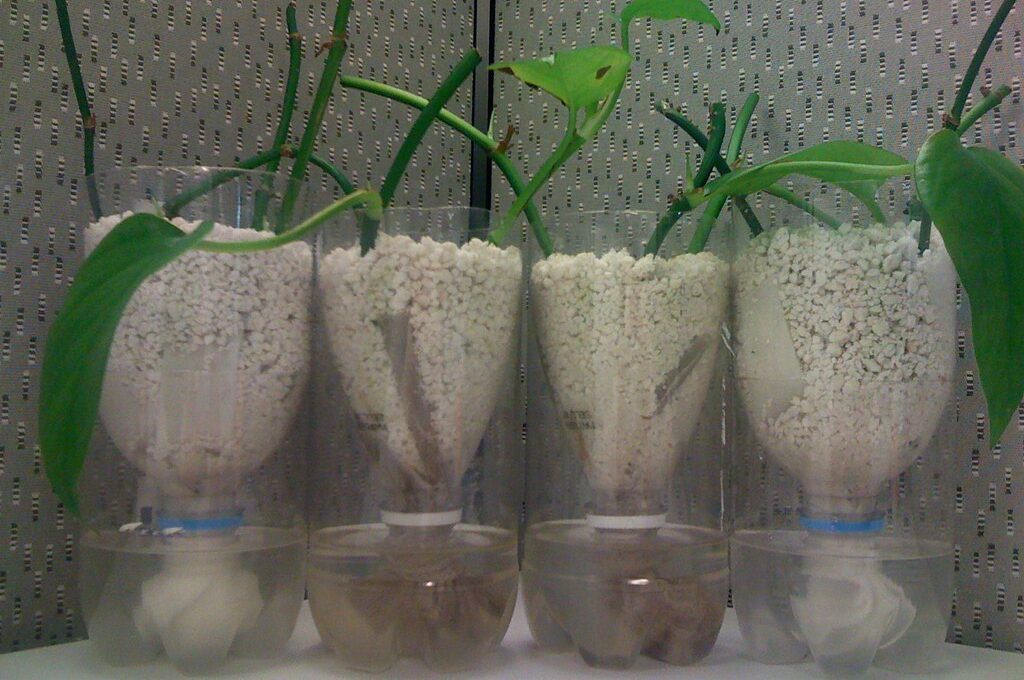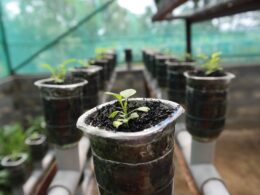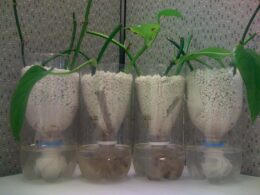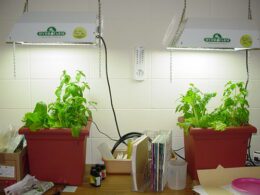Do you want to ensure that your hydroponic garden is healthy and productive? Then it’s essential to pay attention to the water you use. After all, water is the lifeblood of your plants, and it’s the primary means by which they receive the nutrients they need to thrive.
But when it comes to water quality, many factors come into play. For example, is tap water suitable for hydroponics? It’s a common question, and the answer is not straightforward.
While tap water can be an excellent source of water for hydroponic systems, it’s essential to understand the potential drawbacks and how they can affect your plants. In this article, we’ll explore the importance of water quality in hydroponics and the factors you should consider when deciding whether tap water is suitable for your hydroponic garden.
We’ll also look at the different types of tap water and their suitability for hydroponic systems, as well as how you can meet the specific needs of different hydroponic setups. By the end of this article, you’ll have a better understanding of how to make informed decisions about the water you use in your hydroponic garden and how to ensure that your plants stay healthy and productive.
Understanding the Importance of Water Quality in Hydroponics
You need to understand how crucial it is to have top-notch quality in the water you use for your hydroponic system. Water is the lifeblood of your plants in a hydroponic setup, and it’s important to ensure that it’s free from impurities and contaminants.
Water filtration is an essential part of the process of ensuring that your plants receive the best possible water. Investing in a good water filtration system is a must for any hydroponic gardener. This will not only ensure that your plants receive clean and pure water, but it can also help to maintain the ideal pH balance.
One important aspect of water quality is its pH balance. The ideal pH range for hydroponic plants is between 5.5 and 6.5. If the water you’re using is too acidic or alkaline, it can have a negative impact on your plants’ growth and development. Regular testing of the pH levels of your water is crucial to ensure that it’s within the ideal range.
Remember, your hydroponic system is only as good as the water you use, so don’t skimp on quality. Ensure that your plants receive the best possible start by providing them with the top-notch water they need to thrive.
Factors to Consider When Deciding Whether Tap Water is Suitable for Hydroponics
When considering whether to use your local municipal water supply in your hydroponic system, it’s important to analyze the water source quality. Tap water may contain a range of minerals and chemicals that can affect the pH balance of your hydroponic system.
It’s important to test the pH of your tap water to ensure that it falls within the ideal range for your plants. In addition to water source quality, pH balance considerations are also important when deciding whether tap water is suitable for hydroponics.
The pH balance of your hydroponic system can affect the availability of nutrients to your plants. If the pH is too high or too low, your plants may not be able to absorb the nutrients they need to thrive. It’s important to monitor the pH levels of your hydroponic system regularly and adjust them as needed.
Overall, tap water can be suitable for hydroponics, as long as you take the necessary steps to ensure water source quality and pH balance. Testing your tap water and monitoring the pH levels of your hydroponic system can help you maintain healthy and thriving plants. With proper care and attention, you can use tap water in your hydroponic system without compromising the success of your plants.
Different Types of Tap Water and Their Suitability for Hydroponics
Let’s explore the different types of H2O available to us and how they can affect the health of our hydroponic plants.
One factor to consider is the hardness of the water. Hard water has a high concentration of minerals like calcium and magnesium, which can cause blockages in the system and affect the pH levels.
Soft water, on the other hand, has a low concentration of minerals and can lead to pH fluctuations.
It’s important to note that tap water can also vary in pH levels, which can have a significant impact on your hydroponic plants. Ideally, the pH levels should be between 5.5 and 6.5 for most plants.
If the pH levels are too high or too low, this can affect nutrient absorption and overall plant health. You can use pH testing kits or meters to monitor the pH levels of your tap water and adjust accordingly.
In summary, understanding the different types of tap water and their suitability for hydroponics is crucial for the success of your plants. Factors like the hardness of the water and pH levels can have a significant impact on plant health.
By monitoring and adjusting these factors, you can ensure that your hydroponic plants have the best chance of thriving.
Is Boiled Water a Safer Alternative to Tap Water for Hydroponics?
Using boiled water for hydroponics may seem like a safer alternative to tap water. Boiling water kills harmful bacteria and pathogens, reducing the risk of contamination. However, boiling alone may not eliminate all impurities, such as chemicals or heavy metals present in tap water. Therefore, it is crucial to conduct water quality tests and consider appropriate filtration systems to ensure a healthy hydroponic environment.
Meeting the Specific Needs of Different Hydroponic Systems
Meeting the specific needs of different hydroponic systems is crucial for achieving optimal plant growth and yield. This involves taking into account the pH levels and nutrient requirements of the plants to be grown.
Tap water can be a good source of water for hydroponics, but it may not always meet the specific needs of your hydroponic system. Here are some tips for ensuring that you meet the specific needs of different hydroponic systems:
-
pH balancing: Hydroponic systems require a specific pH range for optimal plant growth. Tap water may not always have the ideal pH for your plants, so it’s important to test and adjust the pH of your water as needed. You can use pH testing kits to ensure that the water you use is in the appropriate range for your plants.
-
Nutrient supplementation: Tap water may not always contain enough nutrients for your plants to grow optimally. To ensure that your plants get the nutrients they need, you may need to supplement your water with additional nutrients. There are many different types of nutrients available for hydroponics, so it’s important to choose the right nutrients for your specific plants and system.
It’s important to note that the specific needs of your hydroponic system will depend on the plants you are growing and the type of system you are using. Be sure to research the requirements of your specific plants and hydroponic system to ensure that you are providing the optimal conditions for growth.
By balancing the pH of your water and supplementing with nutrients as needed, you can ensure that your plants grow strong and healthy in your hydroponic system.
Conclusion: Making Informed Decisions About the Water You Use in Your Hydroponic Garden
Ensuring that you provide your hydroponic plants with the appropriate pH levels and nutrient supplementation is crucial for achieving optimal growth and yield, allowing you to cultivate a thriving and bountiful garden. However, equally important is the water source that you use.
While tap water may be convenient and readily available, it may not always be the best option for your hydroponic system. Water source alternatives are worth exploring when it comes to hydroponics. For instance, using rainwater or distilled water can help minimize the risk of contaminants that may harm your plants.
It’s also important to test the water quality of your chosen source regularly. By doing so, you can ensure that your plants are receiving the appropriate levels of essential minerals and nutrients, while also preventing any potential damage that may be caused by an imbalance in pH levels.
Making informed decisions about the water you use in your hydroponic garden is key to ensuring the success of your plants. Remember, the quality of the water you use can have a significant impact on the growth and yield of your crops. So, take the time to research and experiment with different water sources, test the quality of your water regularly, and make any necessary adjustments to ensure that your hydroponic system is thriving.
Frequently Asked Questions
Are there any harmful chemicals in tap water that can harm hydroponic plants?
When it comes to hydroponics, you may be wondering if tap water is safe to use for your plants. The truth is, tap water can contain harmful chemicals like chlorine and fluoride that can negatively impact the growth and health of your hydroponic plants.
To ensure the purity of your water, it’s recommended to conduct water purity tests and consider alternative water sources like filtered or distilled water. By taking these precautions, you can provide your hydroponic plants with the clean, safe water they need to thrive.
Can tap water be used for all types of hydroponic systems?
When it comes to hydroponic systems, tap water can be a viable option, but it’s not the only one. Water source alternatives, such as reverse osmosis or distilled water, can be used to avoid any potential harmful chemicals in tap water that may harm your plants.
However, if you choose to use tap water, it’s important to make sure that the nutrient solution you use is compatible with the minerals already present in your water. You can test this by measuring the pH and nutrient levels of your tap water before adding any additional nutrients.
By being mindful of your water source and nutrient solution compatibility, you can ensure the health and safety of your hydroponic plants.
How often should tap water be changed in a hydroponic system?
To ensure healthy plant growth in your hydroponic system, it’s important to pay attention to the frequency of water changes. Changing the water too often can disrupt the delicate balance of nutrients in the solution, while not changing it enough can lead to the growth of harmful bacteria.
As a rule of thumb, it’s recommended to change the water in your hydroponic system every 1-2 weeks. This will help to maintain optimal nutrient levels and prevent any harmful buildup in the water. Keep in mind that the frequency of water changes may vary depending on factors such as the size of your system and the type of plants you’re growing.
By staying on top of water changes, you can ensure that your plants are getting the nutrients they need for healthy growth.
Is it necessary to use a water filter for tap water in hydroponics?
When it comes to hydroponics, water quality is crucial for the health and growth of your plants. While tap water can be used, it’s important to consider the filtration methods used to ensure its purity.
Using a water filter can help eliminate any harmful chemicals and contaminants that could be present in the tap water. This can lead to healthier plants and a more successful hydroponic setup overall.
Remember, the quality of your water directly impacts the quality of your plants, so investing in a reliable filtration system is a wise choice for any hydroponic gardener.
Can tap water pH levels be adjusted for hydroponic use?
Adjusting tap water pH is crucial for successful hydroponics. Nutrient deficiencies can occur if the pH isn’t within the optimal range for plant growth. While tap water is generally safe for hydroponics, it’s important to test and adjust the pH as necessary.
Adding pH adjusters like pH up or pH down can help bring the tap water to the desired pH level. It’s also important to regularly check and adjust the pH throughout the growing process to ensure healthy plant growth and prevent any potential nutrient deficiencies. By taking the time to adjust tap water pH, you can ensure your hydroponic plants receive the proper nutrients and thrive in their environment.
Conclusion
So, is tap water good for hydroponics? It depends.
While tap water can be suitable for some hydroponic systems, it’s important to consider factors such as water quality, pH levels, and nutrient content before making a decision.
If you choose to use tap water, it’s important to monitor its quality and adjust accordingly to ensure optimal plant growth. However, using filtered or distilled water may be a safer option for sensitive plants or for those living in areas with poor water quality.
Ultimately, making informed decisions about the water you use in your hydroponic garden can lead to healthier plants and a more successful growing experience.









